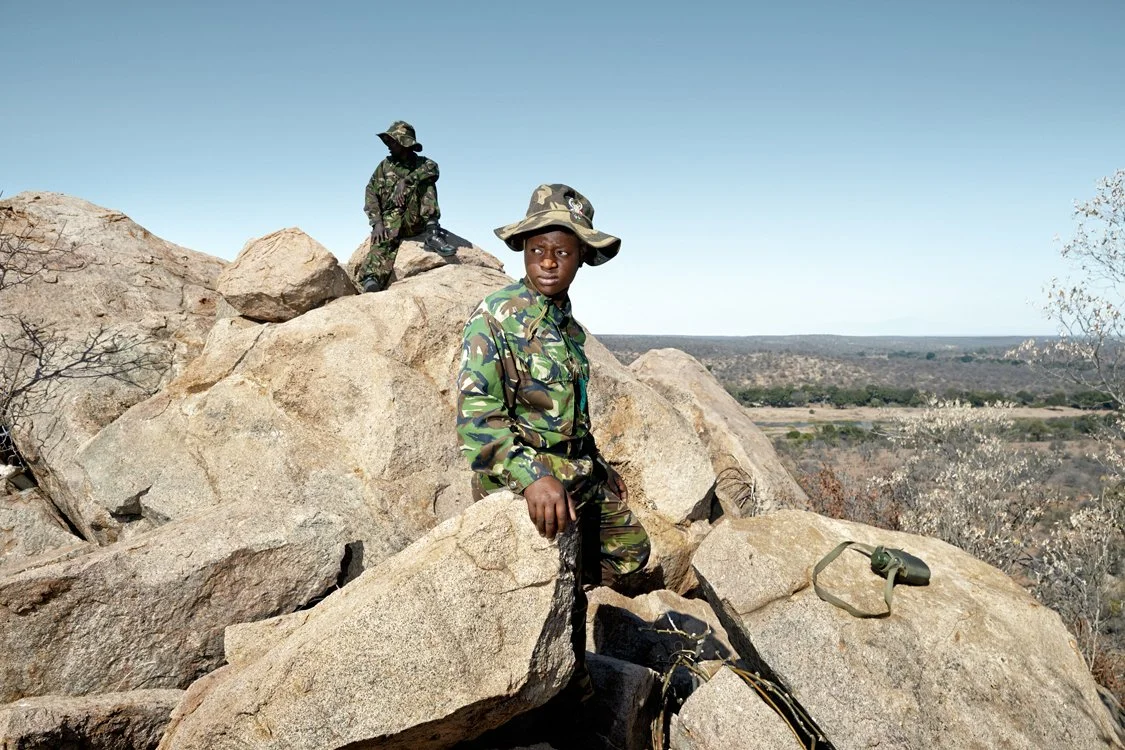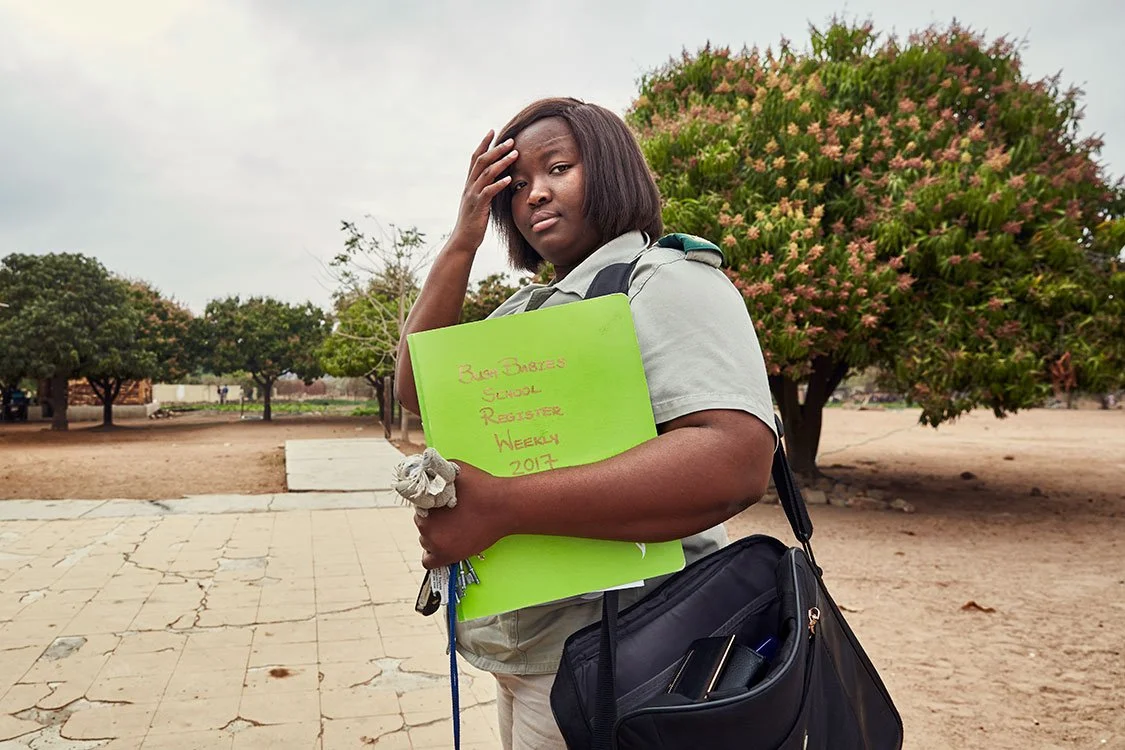
The Black Mambas
South Africa, 2015 & 2017
The Black Mambas are an all female anti-poaching unit, which operates, unarmed, in Balule Nature Reserve, near Kruger National Park, in north-eastern South Africa. Trained in anti-poaching and survival skills, the Black Mambas are taught to identify and track humans and animals, how to blend in with their surroundings and how to avoid confrontations. Their training is crucial as the animals they track are wild, and poachers shoot to kill.
Their anti-poaching strategy includes ‘visual policing’ through daily foot patrols along the parks boundaries at dawn and by vehicle at dusk, manning observation and listening posts stationed in critical areas such as known entry and exit points, and monitoring popular waterholes for signs of poisoning. The Black Mambas also live in a series of compounds inside the reserve, which affords them a constant presence in the park.
Awarded with the UN’s top environmental award, “Champions of the Earth”, the Black Mambas act as role models in their own communities (where many of the poachers live). As women and mothers, they command a kind of respect that the heavily armed, most male anti-poaching units, do not.
Black Mambas Felicia (left) & Joy, 2015.
Black Mamba Zenzele, 2017. Zenzele's dream is to be able to support her mother, as well as her 11 year old son.
Black Mamba Leitah, 2015. "I am strong, I am a woman and I bite like a Mamba!"
Black Mamba units regularly patrol more than 20km in one day, 2015.
L - R: Grietjie Team Leitah, Lukie (background), Nkateko, Cute and Qolile, 2017.
Black Mambas Felicia (left) & Joy checking and reloading camera traps, 2015.
Black Mamba Loveness, 2017.
Impala horn, 2015.
Black Mamba Thato, 2017. Thato joined in 2016 and is one of several drivers. She is responsible for getting the patrols safely to and from camp, as well as transporting equipment between the camps.
Black Mamba Yenzekile reports the location of a dead Kudu, 2015. The Kudu had been shot, although it was not clear by whom. Balule consists of a number of smaller, privately owned parks, some of which allow hunting as a form of income for the park.
Black Mamba Lukie, 2015. “Poaching is very bad. It is important that animals live. The next generation must know the rhinos and elephants in life. If poaching is allowed they will only see these animals in a picture. This is not right.”
Black Mamba Proud (left) & Yenzekile with snares, 2015.
Black Mamba Nkateko & Happy on their way up to hill top, 2015.
Black Mamba Nomsa, 2017.
Black Mamba Nkateko (front) & Happy on hill top. Balule Nature Reserve is a protected area in Limpopo Province which forms part of the Greater Kruger National Park as a member of the Associated Private Nature Reserves (APNR). As part of a wildlife conservation initiative, all fences separating APNR reserves- Balule, Timbavati, Klaserie, Umbabat, Grietjie and Kruger National Park have been removed.
Black Mamba Belinda, 2017.
Black Mamba Leitah, 2017.
Black Mamba Nkateko, 2017.
Black Mambas patrol the reserve, 2015.
Black Mambas meeting, 2015.
Black Mambas take a break, 2015.
Black Mamba Joy on a foot patrol, 2015.
Lion tracks, 2015.
Black Mamba Nkateko inspects a hole under a Balule Reserve fence for signs of poachers. As well as poachers, various species of animals will dig under the fence to either get out of- or into the reserve.
Black Mambas waiting for a herd of elephants to pass, 2015.
Black Mambas Belinda (left) and Dedeya, 2015.
Black Mamba Nkateko overlooks the reserve, 2015.
Black Mamba Proud during a foot patrol, 2015.
Black Mamba Lukie, 2017.
Black Mamba Happy during a foot patrol, 2015.
Three Black Mambas and their driver use the light of a full moon to look for poachers from their jeep. Full moon is when poachers are at their most active, making use of the moonlight to spot their prey. The Black Mambas use the same moonlight to hunt the poachers.
The Black Mambas Anti-Poaching Unit logo on one of the vehicles at base camp, 2015.
Black Mamba Felicia with flashlight during night patrol, 2015.
Black Mamba Nomuntu, 2017.
Black Mamba Mirren, 2017.
Black Mamba Thuli, 2017.
Night patrol with Black Mamba Nkateko, 2017.
Grietjie Camp by night, 2017.
Black Mamba Yenzekile at the beginning of a night patrol, 2015.
Black Mamba Belinda is home schooling her daughter Acacia. Tamia reads along. Hluvukani, Manyeleti, 2017.
Black Mamba Nkateko is folding the fresh washed school uniform of her younger sister Rirhandzu, Hluvukani, Manyeleti, 2017.
Black Mambas Leitah & Goodness play with Qolile’s son Renold at home, Hluvukani, Manyeleti, 2017. The Black Mambas are a close knit unit outside the reserve as well as inside. Several are related, or live in the same villages.
Black Mamba Everjoy in her family's kitchen, Hluvukani, Manyeleti, 2017.
Black Mamba Yenzekile in her bedroom that she shares with her sister Qolile, Hluvukani, Manyeleti, 2017. Yenzekile is about 7 months pregnant and on maternity leave.
Black Mamba Mirren and her daughter Tracy at home, Hluvukani, Manyeleti, 2017.
Black Mamba’s Leitah, Yenzekile, Mirren with her two children, Goodness with Qolile’s baby Renold and Qolile walking towards a field to pick up some vegetables in their home village, Hluvukani, Manyeleti, 2017.
From left to right: Black Mambas Mirren, Winnie, Belinda & Dedeya, 2015.
Back to base, 2015.
Black Mamba Winnie, 2015.
Black Mamba Proud, 2017.
Black Mamba Nkateko, 2015.
Black Mamba Leitah with her son Clayton at home, Hluvukani, 2017. Many of the Black Mambas are single mothers, who only get to see their children for the nine days they are home on leave every month. Most children stay with relatives, or in communal houses that multiple siblings share.
Black Mambas Yenzekile & Proud, 2015.
Black Mamba Lukie & her mom Leah, Hluvukani, Manyeleti, 2017.
Black Mamba Nkateko (left) & Happy on hill top, 2015.
Black Mamba Qolile, 2015.
Black Mamba Camp, Balule Nature Reserve, South Africa, 2015.
Bush Babies education officer Lewyn Maefala arrives at Mhala Mhala Primary School, one of ten that participates in the Bush Babies Environmental Education Program, 2017.
Bush Babies education officer Lewyn Maefala stands in front of the class, Mhala Mhala Primary School, 2017.
Students take notes, Mhala Mhala Primary School, 2017.
A student listens intently, Mhala Mhala Primary School, 2017.
Students at Phalaborwa Primary School crowd around Bush Babies education officer Lewyn Maefala who carries a plastic box filled with elephant dung, 2017.
Students wait to answer Bush Babies education officer Lewyn Maefala’s question, Phalaborwa Primary School, 2017.
Bush Babies education officer Lewyn Maefala shows a student a dried ball of elephant dung, Phalaborwa Primary School, 2017.
A student’s notebook during a class about mammals, Mhala Mhala Primary School, 2017.
Mhala Mhala Primary School, 2017.
Morning prayer, Foskor Primary School, 2017.
Students listen to Black Mamba scout Nkateko Mzimba talk about poaching, Foskor Primary School, 2017.
Bush Babies education officer Lewyn Maefala talks to children at Maseke Primary School, 2017.
Black Mamba Nkateko Mzimba talks to children at Maseke Primary School, 2017.
Black Mamba Nkateko and Bush Babies education officer Lewyn laugh after realizing that three of the students in their class are the children of fellow Black Mambas, Maseke Primary School, 2017.
Black Mamba Nkateko Mzimba leaves the classroom to show students how to properly stand at attention, Foskor Primary School, 2017.
Black Mamba Nkateko Mzimba demonstrates how to shout orders to a group of school children, Foskor Primary School, 2017.
Black Mamba scout Nkateko Mzimba shows students how to properly stand at attention, Foskor Primary School, 2017.










































































